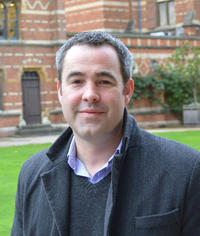Five RSC prizes for Department of Chemistry scientists
Six University of Oxford academics have been honoured in the Royal Society of Chemistry (RSC)’s annual Research and Innovation Prizes – more than any other institution this year. Five of the scientists are based here in the Department of Chemistry, with
a sixth in the Department of Materials Science.
The awards are among the most prestigious research prizes in the world, recognising achievements by individuals, teams and organisations undertaking excellent work in the chemical sciences.
Dr Helen Pain, Chief Executive of the Royal Society of Chemistry, said: ‘The RSC’s prizes programme enables us to reflect on and celebrate the incredible individuals and teams whose brilliance enriches our knowledge, advances our understanding, and brings
new ideas and technologies that benefit society as a whole. We’re very proud to recognise the contributions of our winners today.’
Professor Mark Brouard, Head of the Department of Chemistry, said: “We are delighted that so many of our academics have been recognised today with these prestigious awards. The range, depth, and importance of their work, from understanding new reaction
pathways to unlocking green synthetic processes for the future, is inspiring, and stands as a testament to the ground-breaking work that so many people do in our Department’s laboratories every day.”

Dr Josef Boronski, Dalton Emerging Researcher Prize
Actinide elements, such as uranium, are used as nuclear fuel and are produced as waste during the generation of nuclear energy. The radioactive nature of these elements means they are more challenging to investigate and are relatively poorly understood.
Dr Boronski’s fundamental research is revealing insights into the chemistry of actinides at the interface of the metallic and molecular phases. This information could help better understand the environmental behaviour and speciation of actinide elements.
It also has the potential to inform new methods for the recycling of spent nuclear fuel or for the separation and management of the components of nuclear waste.
Dr Boronski said:
This prize has reminded me how privileged I am to be able to carry out chemical research and to be afforded the first glimpses of some of nature’s unseen facets and features. It has also given me the chance to reflect on the support I’ve received
from my mentors and colleagues, past and present. I’m indebted to all of them for everything they’ve taught me.

Professor Tom Brown, Khorana Prize
Professor Brown’s research involves the use of chemical synthesis to make analogues of nucleic acids that can be used in biological and biomedical applications. These include genetic analysis and diagnostics to identify mutations that can lead to disease,
and forensic analysis and therapeutic applications. His research group are developing methods to move small nucleic acid strands efficiently into cells where they can interact with the genetic machinery. This will have implications for the treatment
of diseases that are resistant to current therapies.
Professor Brown said:
There are many individuals working in the area of chemical biology who have achieved great things, and to whom I look for inspiration. To be selected for the Khorana Prize is therefore a great honour. It is essential that I recognise the creativity
and dedication of my research group who did the work that led to the award. These are exciting times in the nucleic acid field and they are well placed to make major contributions in the future.

Professor Darren Dixon, Tilden Prize
Professor Dixon’s research group strives to invent new molecular tools, catalysts, and reactions that enable scientists in academia and industry to make valuable molecules for the first time, or much more quickly than was possible previously.
One major theme of their work is to discover and develop new strategic bond-forming reactions from functional groups (groups of atoms bonded in a specific way) that are ubiquitous in the natural world but had previously been considered inert or highly
resistant to bond formation. Enabling new reactivity from these abundant molecules can unlock applications that were previously considered impossible.
Professor Dixon said:
I am humbled to join the list of distinguished chemists that have previously been awarded the Tilden prize. It is recognition of the skills, dedication, and commitment of my research group, both past and present. It has been a pleasure to work
with so many talented researchers over the years and I am proud of their many contributions to the field of organic synthesis.

Professor Stephen Fletcher, Merck, Sharp and Dohme Prize
Professor Fletcher’s research group are working on new variations of cross-coupling reactions: a key component of organic chemistry which have found widespread use in both academia and industry. In particular, he aims to use these to make complex molecules
that are not readily available via other synthetic methods, and to improve the efficiency of the synthesis of molecules which are of interest for their structural or biological properties. They can then be tested for biological activity and, for example,
their potential in drug discovery.
Professor Fletcher said:
I am extremely pleased to receive this prize from the RSC and it represents the culmination of a tremendous amount of work from members of my research group on designing and testing new chemical reactions and examining how these can be used in
order to access important molecules.

Professor Ludmilla Steier, Materials Chemistry Early Career Prize
Professor Steier’s group develops materials that can use solar energy to make energy-rich and therefore high value chemicals, such as hydrogen, ethylene and methanol, from water and atmospheric carbon dioxide. The chemicals can function as a fuel (and
a form of energy storage) as well as a chemical feedstock for various branches of the chemical industry. Using a technique called atomic layer deposition, coupled with material characterisation carried out during catalysis, the group links material
properties with catalyst performance, which is key for developing the next generation of materials.
Professor Steier said:
It is highly encouraging to receive such strong support from my nominator(s) and referee and even more so to receive this recognition from the RSC and the chemists it is formed of. When I told my group it was pretty much a shared feeling of "time
to celebrate and organise a group dinner". And when I told my family and friends, I admit I also felt proud.

Professor Robert Weatherup, from Oxford's Department of Materials, was also a winner this year, receiving the Joseph Black Prize. Professor Weatherup’s work focuses on observing the
reactions that occur at the interfaces between materials and their operating environment. This is often where both beneficial and undesired reactions take place. In Lithium-ion batteries, for example, charge is stored by transferring Lithium ions
across the interface between a liquid electrolyte and a solid electrode. At the same time, the electrolyte can break down producing undesired products and wasting charge.
Given these interfaces are usually buried within a battery, it can be challenging to obtain information on the chemical changes occurring. Professor Weatherup has developed several new approaches that use X-rays to access these interfaces through thin
windows, helping us to better understand the processes that limit the lifetime of batteries, or the efficiency of catalysts used for the green production of chemicals.
Professor Weatherup said:
I was delighted and honoured to receive this prize from the RSC. I’m really grateful to all the collaborators and colleagues who’ve supported my work along the way and, in particular, the amazing contributions of my research group.
Further information about the RSC Prizes can be found on the RSC website.
https://www.youtube.com/embed/vMajkaZ072g




